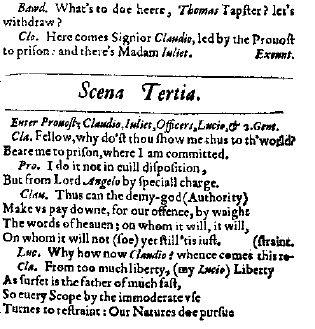|
|
MISTRESS OVERDONE.
What's to do here, Thomas tapster? Let's withdraw.
|
|
|
|
POMPEY.
Here comes Signior Claudio,
led by the provost to prison; and there's Madam Juliet.
|
|
| Enter PROVOST, CLAUDIO, JULIET, OFFICERS. |
|
|
CLAUDIO.
Fellow, why dost thou show me thus to
the world? Bear me to prison, where I am committed.
|
|
|
|
PROVOST.
I do it not in evil disposition,
But from Lord Angelo by special charge.
|
|
|
|
CLAUDIO.
Thus can the demigod Authority
Make us pay down for our offence by weight
The words of heaven; on whom it will, it will;
On whom it will not, so; yet still 'tis just.
|
|
| Enter LUCIO and two GENTLEMEN. |
|
|
LUCIO.
Why, how now, Claudio? whence comes this restraint?
|
|
|
|
CLAUDIO.
From too much liberty, my Lucio, liberty:
As surfeit is the father of much fast,
So every scope by the immoderate use
Turns to restraint. Our natures do pursue,
|
|
|
 |
The Folio has five scenes in the first act, but practically all modern editions of Measure for Measure (including our Interactive Shakespeare edition) have only four scenes. Scena Tertia is traditionally folded into the second scene. This creates a number of staging problems and issues. First, where does Scene Two take place? There is no reference in the Folio as to where it is situated. Many modern directors and designers place the scene in a brothel or a pub, but what impact does this have upon "Scena Tertia?" Does the Provost bring Claudio into this setting or do the occupants of the brothel (Lucio, 2 Gents, Overdone, & Pompey) come "outside?" Also note the presence of Juliet in the cast of characters for Scena Tertia. Juliet has no lines in this scene and there is no further reference to her in the stage directions. Is this the fault of the editors of the Folio? Did she have lines in an earlier (now lost) version of the play? Or is she intended to be a "silent presence" who merely observes her imprisoned lover? Is Juliet already under arrest as well? Does she interact with Claudio? This is a prime example of how staging choices are crucial to our understanding of Shakespeare's work.
|
